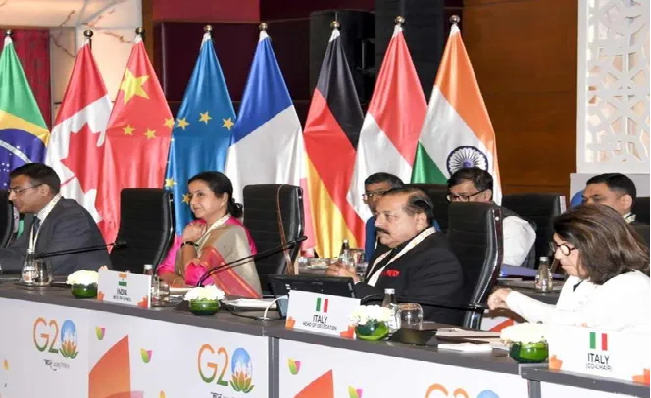Railways gives 9,000 jobs in Quarter 1, plans 50,000 for FY 2025-26
.gif)
.gif)

India today urged G-20 countries to adopt multilateral measures for faster extradition of fugitive economic offenders and asset recovery both on the domestic front and from abroad during the 1st Anti-Corruption Working Group of G20 meeting held in Gurugram, Haryana.
Charing the Meet with the Co-Chair Italy, Union State Minister (Independent Charge) Science & Technology; Minister of State (Independent Representative) for Earth Sciences; MoS PMO, Personnel, Public Grievances, Pensions, Atomic Energy and Space, Dr. Jitendra Singh said in his inaugural address that Prime Minister Narendra Modi envisioned the development of such an administrative ecosystem for a developed India that has zero tolerance for corruption.
Dr. Jitendra Singh said, “Economic crimes are a problem that many people face, especially when the perpetrators are fleeing the country's jurisdiction. India has introduced specialized legislation in this regard in the form of the Fugitive Economic Offenders Act, 2018, a term in which a "Fugitive Economic Offender" ("FEO") is defined as a person against whom an arrest warrant is issued in relation to a Scheduled Offense has been extradited by any court in India and who has left the country to avoid prosecution; or the FEO abroad refuses to return and face criminal prosecution”.
Dr. Jitendra Singh also informed the media that the Enforcement Directorate has transferred assets worth about USD 180 billion to public sector banks which have suffered losses of around USD 272 billion due to fraud committed by high net worth individuals. He informed the G-20 delegates, India's view is that strengthening mechanisms for quick confiscation of proceeds of crime at home and abroad will force criminals to return to their home country.
Adding to it Singh said that corruption is a complex social, political and economic challenge that affects all countries and in a globalized world, corruption has implications far beyond the G20. He said it adversely affects the efficient use of resources, creates market distortions, adversely affects the quality of life of citizens, impacts the benefits of globalization and consequently economic growth and overall governance, and most disproportionately affects the poor and most marginalized.
The primary forum for global economic cooperation, the G20 must take responsibility for leading global efforts to combat the menace of corruption. Since its establishment in 2010, the G20 Anti-Corruption Working Group (ACWG) has been at the forefront of tackling all forms of corruption, the minister added.
Dr. Jitendra Singh recalled that Prime Minister Modi had said on many occasions, “A safe and secure world is our shared responsibility. When the forces of good work together, the forces of evil cannot function". The minister emphasized that India's G20 chairmanship will focus on providing an effective, efficient and responsive mechanism for asset recovery and information sharing among G20 countries.
Dr. In his closing remarks, Jitendra Singh said it is important that all parties reflect the same commitment against corruption and expressed confidence that the Anti-Corruption Working Group under the chairmanship of India and co-chairmanship of Italy will deliver substantial results aimed at preventing and fighting corruption.